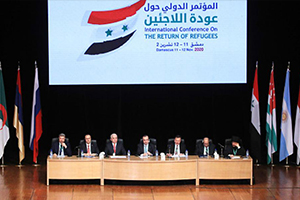
Ahmed Murad – Survey Program Coordinator, The Day After
Russia succeeded in holding a conference on the return of Syrian refugees in Damascus in mid-November 2020. But in many other ways, the conference failed. It failed to garner support or produce outcomes relevant to the reality of the situation of refugees. It failed to address the core of the refugee problem, attributing it instead to economic and other causes brought about by sanctions against the Syrian regime. The conference also transparently attempted to bypass Security Council resolutions and the Geneva Communique, which form the basis for the political situation in Syria. Finally, it failed to secure the attendance of almost all countries that host a significant number of Syrian refugees, including the EU.
UN statistics show there are over 13 million Syrian refugees: 6.6 internationally and 6.5 million internally displaced. During the conference, Bashar Assad said, “Countries hosting the refugees contrived fabricated conditions for mass exodus.”
But how do Syrian refugees view their options for return, and what are their priorities? A survey conducted by TDA in 2019 with 2,131 Syrians, both inside and outside Syria, affirms that arbitrary attacks on civilians and detainment is what forced Syrians to flee their homes. According to the report, the frequency of attacks escalated between 2015 and 2017 as the regime tightened its control over Syrian cities aided by Russia – who at that point joined confrontations against opposition forces. The regime and Russia were directly responsible for up to 60% of violations against civilians, while 32% were committed by ISIS.
Additionally, TDA issued a report entitled “Mass Forced Displacement and its Consequences under a ‘Reconciliation Agreement,’” conducted in 2019 with over 10,000 Syrians displaced to northern Syria.
Respondents confirmed that the regime was responsible for the displacement of civilians. 92% said that regime forces and Russia, backed by their militias, were the ones who had forced them to leave. 77% gave their main reason for leaving as fear of being killed or arrested, while 5% left to escape mandatory military service.
Syrian refugees in Turkey see that the most important preconditions for the return of refugees are departure of the Syrian regime, conditions for safe return, and the ability to return to their original places of residence. Results of a survey published by TDA in 2020 entitled “Syrian Refugees in Turkey: Perceptions on Return to Syria” show that 74% of refugees in Turkey expressed the desire to return to Syria if essential conditions are met. 71% of Syrians link their return to the departure of the Syrian regime, a prerequisite in a list of priorities; at 60%, the second priority is an end to shelling and military operations; and at 46%, the third priority is to return to a place where the law prevails and where they will not be hounded by the security apparatus. By contrast, and despite their importance, respondents do not see the availability of basic services and health care as a prerequisite for return, rating them at 5th and 6th.
According to the report, the improvement of economic conditions and availability of services only seems to be essential to a quarter of respondents; i.e., counting on reconstruction funds as an undeclared goal of the refugee conference and reviving the Syrian economy is not among the priorities that refugees in Turkey state for their return.
Results of the 2020 report on Syrians in Turkey clarify that return is linked to return to original domicile. 71% of those surveyed refuse to return to any other than their original areas of residence, destroyed in regime airstrikes. Meanwhile, the regime still refuses their return to these areas, such as Yarmouk camp, south Damascus and Darayya, and has issued laws and decrees violating property rights, including Law No. 10, and affected demographic change through the manipulation of property deeds and civil registry documents.
The report concluded that the Syrian regime is the main problem and cause behind waves of Syrian refugees, and that the return of refugees is dependent on the disappearance of this problem.
